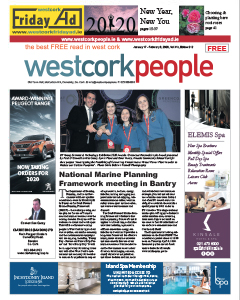We’ve all heard the reports or experienced firsthand the pressure that our A&E departments are under and Cork University Hospital’s Emergency Department (CUH ED) is one of the busiest in the country. Dr Jeff Featherstone, West Cork GP and A&E doctor says things aren’t getting any better or easier for the hardworking doctors and nurses who deal with up to 400 patients every day at CUH Emergency Department.
Dr Featherstone, who works in Mercy University Hospital and Cork University Hospital, believes it is crucial that a dialogue between GP leaders and HSE consultants happens before the winter sets in and the A&E crisis excalates.
A highly experienced medic and award-winning doctor, Dr Jeff Featherstone was one of the first GPs in the UK to be able to perform endoscopies and sophisticated minor surgery in a GP surgery rather than in the traditional hospital settmg.
Dr Featherstone’s hope is that if an honest dialogue opens up then GPs and patients can be better informed by the HSE on the alternative pathways available to A&E.
There are a number of Injury Units around the country, which can treat minor injuries like broken bones, sprains, strains and minor burns. Three are in Cork – in Gurranabraher, in Mallow and in Bantry and the average time someone spends at these units is just two hours. “But they all have different opening hours and a lot of people aren’t even aware these units exist and what they treat,” says Dr Featherstone.
“And many patients with Private Medical Insurance don’t even know there are clinics available to them at Affidea, the Mater Private or the Bons Secours.
“Things are very haphazard and confusing at the moment…GPs and patients don’t know which hospital does what, who has the best waiting list and so on.
“I’m honoured to work with wonderful doctors and nurses but crikey do we work hard and it isn’t getting any easier. It breaks my heart to see young doctors who are unappreciated in this country emigrating.”
According to Dr Featherstone there is way too much pressure put on medical staff especially the triage nurse in A&E. “I’ve seen people waiting for hours, sent home with non-specific symptoms, and then coming back in later on very sick.
“CUH only received 110 complaints in 2018 although the Emergency Department at the hospital sees between 300 and 400 patients a day. “This is a staggerinly low figure and it says a lot about the forebearance and tolerance of the average patient, who indeed deserves better.”
Featherstone believes the perfect storm for chaos is brewing. “People deserve better, West Cork people deserve better. There are four resucitation beds in CUH A&E and if a plane crashes in Cork, we’re in real trouble. If we get the flu jab wrong this year and the flu mutates into something horrible, we’re stumped. To be honest, there’s no real seasonal difference in A&E…it is chaos most of the time!”
Over the coming months Dr Featherstone would like to discuss alternative pathways to A&E attendance. “Let’s open up a dialogue between GP leaders, the HSE and consultants about what we’re doing for the coming winter. Let’s find out what is happening at GP and Primary Care Centres, the Minor Injury Units, Affidea, Mater Private and the Bons. Let’s meet the movers and shakers in the HSE. Let’s invite the CEO of CUH to talk about an A&E consult, coping with winter pressures and any intent to expand the A&E department at CUH. Let’s talk about opening up beds that were closed during times of austerity.
“Let’s open up a dialogue.” In the meantime Dr Featherstone has a few tips for anyone who does have to attend A&E:
1. Bring your tablets with you
2. Note down any previous or present illnesses or allergies – you can get your GP to print out a report
3. Ask a friend or relative to accompany you to A&E
4. Get to know your chronic illnesses ie asthma, diabetes, heart trouble etc – your GP, nurses and Google are a great resource.
5. Use your mobile phone to photograph your prescription or track changes in a rash or mole.
6. If English isn’t your first language download a translation app.
“I still love being a doctor despite the challenges,” says Dr Featherstone. We’re never going to solve all these problems but we sure can try.”
If you would like to contribute to this discussion, please email mary@westcorkpeople.ie.



